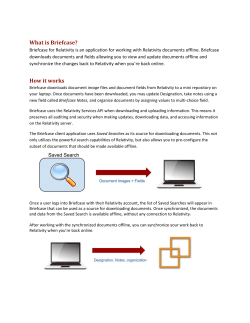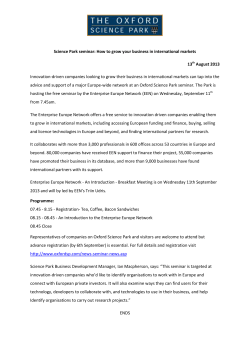
Weaver, Sample Grad Phil of Science Syllabus
Advanced Topics in the Philosophy of Science1 Foundations of Relativity Time: Every Tuesday 4:30pm to 7:30pm Location (when in class): Sample Hall Professor: Christopher Gregory Weaver E-mail: christophergweaver@gmail.com Office Hours: Before seminar in office #? 2:00pm to 3:00pm every day we have class. I. Course Description Advanced Topics in Philosophy of Science: Foundations of Relativity is an advanced graduate level seminar which seeks to immerse students into cutting edge contemporary research on the foundations of both the special and general theories of relativity. II. Learning Objectives 1. Students will acquire an introductory level knowledge of special relativity. 2. Students will acquire an introductory level knowledge of general relativity with some (very little) topology, and differential geometry. 3. Students will become intimately familiar with the state of the art discussions of various puzzles, paradoxes, and foundational issues in the STR. 4. Students will become intimately familiar with the state of the art discussions of various puzzles, paradoxes, and foundational issues in the GTR. III. General Approach Class lectures will be supplemented with lecture notes that I will make available in the resources section of the course website. IV. Textbook The required textbooks for this course are: 1. All of Albert Einstein’s collected papers are available online thanks to Princeton University Press. http://einsteinpapers.press.princeton.edu/papers 2. Harvey R. Brown, Physical Relativity: Space-time from a Dynamical Perspective. New York, New York: Oxford University Press, 2005. 3. Graham Nerlich, Einstein’s Genie: Spacetime Out of the Bottle. Montreal, Quebec, Canada: Minkowski Institute Press. 4. Robert Geroch, General Relativity: 1972 Lecture Notes. Montreal, Quebec, Canada: Minkowski Institute Press, 2013. 5. Various papers and articles found online and via the electronic resources of our academic library. 1 The Instructor reserves the right to adjust the syllabus when he deems that a change is necessary. V. Assignments and Grading Preparation and Class Attendance 10% You are expected to read all of the assigned material. You are also expected to ask questions during the lectures and participate in in-class activities. Missing more than two classes will negatively affect your grade (if you are tardy three times, that will count as one absence. Leaving class early will count as one tardy). It is your responsibility to keep up with any work you miss. Class participation grades will also be affected if disrespect is shown to others. Précis of Final Paper 5% Please write a two page précis of your final research paper. Your précis is due on our thirteenth class meeting. All students will be required to meet with Professor Weaver to discuss their projects. Final Paper 85% Your final paper can be on any topic related to what we cover in class. Your paper should be at least 10pages single-spaced, justified, and in Times New Roman font (size 12), with one inch margins. The paper should be documented in the University of Chicago manual of style. Final papers are due in PDF format on ______ . VI. Schedule for the _____ Session Part 1: The Special Theory of Relativity 1 (Tuesday): Introduction to the Foundations of Relativity Homework: Reading Assignment #1: Harvey R. Brown, Physical Relativity: Space-time Structure from a Dynamical Perspective. New York, NY: Oxford University Press. Pp. 11-32; Tim Maudlin, Quantum Non-Locality and Relativity. Malden, MA: Blackwell Publishers. Pp. 2943. Science Reading: Sean M. Carroll, Spacetime and Geometry: An Introduction to General Relativity. San Francisco, CA: Addison Wesley, 2004. Pp. 1-12. Video Homework: Leonard Susskind Lectures 1&2. Link 1: Susskind on STR Lecture 1: https://www.youtube.com/watch?v=toGH5BdgRZ4 Link 2: Susskind on STR Lecture 2: https://www.youtube.com/watch?v=qfTJP7Soto4 2 (Tuesday): The Principle of Relativity, Minkowski Coordinates, and Minkowski Spacetime Homework: Reading Assignment #2: Harvey R. Brown, Physical Relativity: Space-time Structure from a Dynamical Perspective. New York, NY: Oxford University Press, 69-90; Tim Maudlin, Quantum Non-Locality and Relativity. Malden, MA: Blackwell Publishers, 2002. Pp. 43-60. Science Reading: Sean M. Carroll, Spacetime and Geometry: An Introduction to General Relativity. San Francisco, CA: Addison Wesley, 2004. Pp. 12-20. Video Homework: Susskind on STR Lectures 3&4&5 Link 3: Susskind on STR Lecture 3: https://www.youtube.com/watch?v=_R6J8Wb1Xek Link 4: Susskind on STR Lecture 4: https://www.youtube.com/watch?v=Z8ace3NbXAA Link 5: Susskind on STR Lecture 5: https://www.youtube.com/watch?v=_DtwlC5e8J8 3 (Tuesday): The Lorentz Transformations; Vectors and Tensors with Minkowski Coordinates Homework: Reading Assignment #3: Harvey R. Brown, Physical Relativity: Space-time Structure from a Dynamical Perspective. New York, NY: Oxford University Press, 2005. Pp. 128-149; Graham Nerlich, Einstein’s Genie: Spacetime Out of the Bottle. Montreal, Quebec, Canada: Minkowski Institute Press, 2013. Pp. 61-74. Science Reading: Sean M. Carroll, Spacetime and Geometry: An Introduction to General Relativity. San Francisco, CA: Addison Wesley, 2004. Pp. 12-29; David H. Lyth and Andrew R. Liddle, The Primordial Density Perturbation: Cosmology, Inflation and the Origin of Structure. Cambridge: Cambridge University Press, 2009. Pp. 12-14. Video Homework: Susskind on STR Lectures 6&7 Link 6: Susskind on STR Lecture 6: https://www.youtube.com/watch?v=aA88mND-9v4 Link 7: Susskind on STR Lecture 7: https://www.youtube.com/watch?v=ozhRFi77TP8 4 (Tuesday): Worldlines; Geodesics; and a Brief Word about Energy-Momentum Homework: Reading Assignment #4: William Lane Craig, ‘The Metaphysics of Special Relativity: Three Views’, in William Lane Craig and Quentin Smith (eds.), Einstein, Relativity and Absolute Simultaneity. New York, NY: Routledge Press, 2008. Pp. 11-49; John S. Bell, ‘How to Teach Special Relativity’, Speakable and Unspeakable in Quantum Mechanics. 2nd Edition. Cambridge: Cambridge University Press, 2004. Pp. 67-80. Part 2: The Philosophical Problems of STR 5 (Tuesday): The Metaphysics of STR: Simultaneity and Time Homework: Reading Assignment #5. Jean-Pierre Luminet, ‘Time, Topology, and the Twin Paradox’, in Craig Callender (ed.), The Oxford Handbook of Philosophy of Time. New York, NY: Oxford University Press. Pp. 528-545; Graham Nerlich, Einstein’s Genie: Spacetime Out of the Bottle. Montreal, Quebec, Canada: Minkowski Institute Press, 2013. Pp. 75-98 and 115-124. 6 (Tuesday): STR and the Twin Paradox Homework: Reading Assignment #6: Robert Geroch, General Relativity: 1972 Lecture Notes. Montreal, Quebec, Canada: Minkowski Institute Press, 2013. Pp. 1-20. Video Homework: Susskind GTR Lecture 1 and Historical Background Documentary Link 1: Susskind on GTR Lecture 1: https://www.youtube.com/watch?v=JRZgW1YjCKk Background Documentary on Einstein: https://www.youtube.com/watch?v=t1Y7AYq8JVI Part 3: The General Theory of Relativity 7 (Tuesday): Events; Light-Cones; Clock Rates; Intervals; the Metric; and World-Lines Homework: Reading Assignment #7: Robert Geroch, General Relativity: 1972 Lecture Notes. Montreal, Quebec, Canada: Minkowski Institute Press, 2013. Pp. 21-48. Video Homework: Susskind on GTR Lecture 2 Link 2: Susskind on GTR Lecture 2: https://www.youtube.com/watch?v=5VKyRVLMMQ4 8 (Tuesday): Acceleration; Curvature; Rotation; Dust; Perfect Fluids; Electromagnetic Fields; Maxwell’s Equations and GTR Homework: Reading Assignment #8: Robert Geroch, General Relativity: 1972 Lecture Notes. Montreal, Quebec, Canada: Minkowski Institute Press, 2013. Pp. 49-68. Video Homework: Susskind on GTR Lecture 3 Link 3: Susskind on GTR Lecture 3: https://www.youtube.com/watch?v=cyW0LWEACfI 9 (Tuesday): Energy-Momentum; Geodesic Deviation; Einstein’s Equation Homework: Reading Assignment #9: Robert Geroch, General Relativity: 1972 Lecture Notes. Montreal, Quebec, Canada: Minkowski Institute Press, 2013. Pp. 69-88. Video Homework: Susskind on GTR Lecture 4 Link 4: Susskind on GTR Lecture 4: https://www.youtube.com/watch?v=YdnLcYNdTzE 10 (Tuesday): The Friedmann Solutions Homework: Read Assignment #10: Harvey R. Brown, Physical Relativity: Space-time Structure from a Dynamical Perspective. New York, NY: Oxford University Press, 150-177; Graham Nerlich, Einstein’s Genie: Spacetime Out of the Bottle. Montreal, Quebec, Canada: Minkowski Institute Press, 2013. Pp. 125-140; Christopher Gregory Weaver, Against Causal Reductionism (draft). Video Homework: Susskind on GTR Lecture 5 Link 5: Susskind on GTR Lecture 5: https://www.youtube.com/watch?v=quWN1V9jOf0 11 (Tuesday): The Gravitational Field as Cause Homework: Reading Assignment #11: Oliver Pooley, ‘Substantivalist and Relationalist Approaches to Spacetime’, in Robert Batterman (ed.), The Oxford Handbook of Philosophy of Physics. New York, NY: Oxford University Press. Pp. 522-586; John Earman, World Enough and Space-Time: Absolute Versus Relational Theories of Space and Time. Cambridge, MA: MIT Press, 1989. Pp. 154-174. Part 4: The Philosophical Problems of GTR 12 (Tuesday): Spacetime Substantivalism vs. Relationalism Homework: Reading Assignment #12: Nick Huggett, ‘The Regularity Account of Relational Spacetime’, Mind. 115, 41-73; Paul Horwich, ‘On the Existence of Time, Space and Spacetime’, Noûs. 12, 397-419; Graham Nerlich, Einstein’s Genie: Spacetime Out of the Bottle. Montreal, Quebec, Canada: Minkowski Institute Press, 2013. Pp. 141-166, and 191-198. 13 (Tuesday): Spacetime Substantivalism vs. Relationalism Continued Homework: Reading Assignment #13: Tim Maudlin, ‘Buckets of Water and Waves of Space: Why Spacetime is Probably a Substance’, Philosophy of Science. 60, 183-203; John Earman, World Enough and Space-Time: Absolute Versus Relational Theories of Space and Time. Cambridge, MA: MIT Press, 1989. Pp. 175-208. 14 (Tuesday): Spacetime Substantivalism vs. Relationalism Continued Homework: Reading Assignment #14: Chris Smeenk and Christian Wüthrich, ‘Time Travel and Time Machines’, Craig Callender (ed.), The Oxford Handbook of Philosophy of Time. New York, NY: Oxford University Press, 577-630; John Earman, Bangs, Crunches, Whimpers, and Shrieks: Singularities and Acausalities in Relativistic Spacetimes. New York, NY: Oxford University Press, 1995. Pp. 160-202; Frank Arntzenius, ‘Time Travel: Double your Fun’, Philosophy Compass. 1, 599-616; Max Black, ‘Why Cannot an Effect Precede Its Cause?’, Analysis. 16, 49-58; J.B. Manchak, ‘On the Existence of “Time Machines” in General Relativity’, Philosophy of Science. 76, 1020-1026. 15 (Tuesday): GTR and Time Travel Homework: Reading Assignment #15: Chris Smeenk, ‘Philosophy of Cosmology’, in Robert Batterman (ed.), The Oxford Handbook of Philosophy of Physics. New York, NY: Oxford University Press. Pp. 607-652. 16 (Tuesday): Philosophy of Cosmology VII. Current Academic Integrity Policy To view the current academic integrity policy, visit the following link here: ____.
© Copyright 2025













